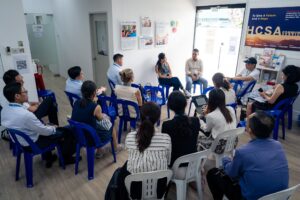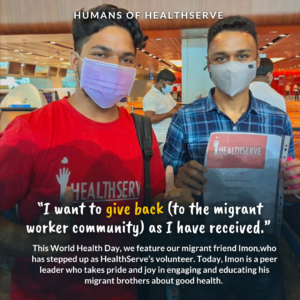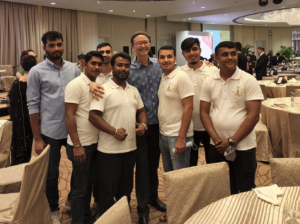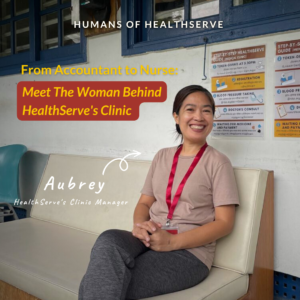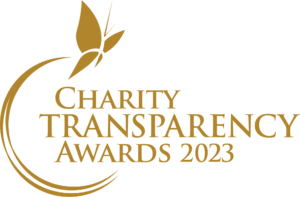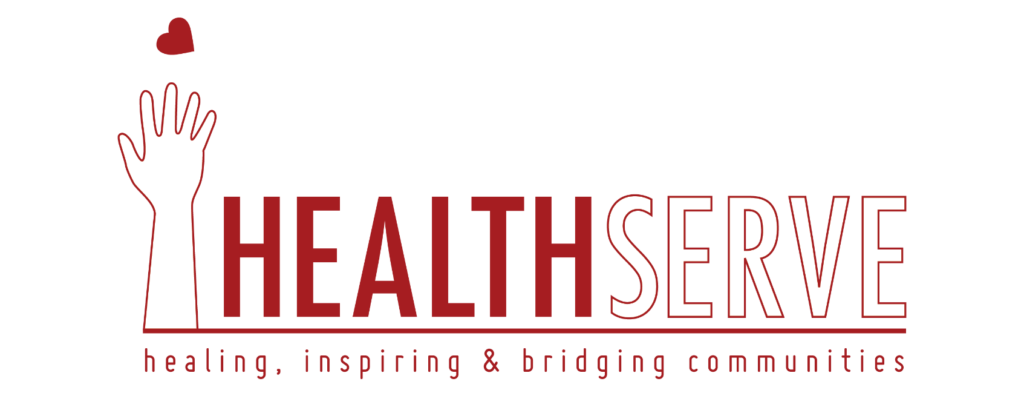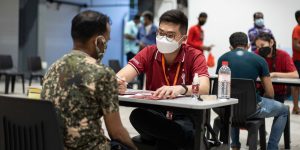By Feng Yanjia, HealthServe intern & student of NUS Master of Social Sciences in Communication

“Why did I choose to become a social worker? Perhaps it was partly because of my childhood experience. When I was younger, I didn’t get to interact with social workers but looking back, I think it would have been helpful had my family received the support and resources we needed earlier.”
This World Social Work Day, we sit down with our social worker Xiu Yi, who first joined HealthServe as an intern while she was pursuing her undergraduate studies in Social Work with NUS. Now a key member of our Casework & Social Services team, Xiu Yi reflects on her time with HealthServe and the migrant brothers she now calls her friends.
Q: There must have been so many cases you have encountered in your past four years with HealthServe. Could you tell us more about a particularly challenging or memorable case?
There are many but I remember one of the first few complex cases that my batch experienced, when I was just starting out as an intern. During that period, the workers we interacted with mostly had salary or injury issues. But there was one Bangladeshi worker who called us and said that he was left stranded somewhere. The employer had not only kicked him out of the dorm, he actually dropped him somewhere even more secluded. It was quite shocking to me then. Why would anyone do that? Because the worker didn’t know where he was, he didn’t know how to get around or how we could pick him up. Thankfully, he eventually found his own way to HealthServe.
I recall the brother was about my age. The fact that someone my age had left his home to come all the way to our country to work, yet be left stranded without help, and not have his basic needs (food and shelter) met… I remember feeling so sad, that was the first time I cried upon hearing about a case in HealthServe.
Q: That’s heart-wrenching… How did the casework team support him then?
We put him up at our shelter for a few months. We also provided food and groceries, while making attempts to contact his employer and resolve the conflict.
In the casework team, our focus is always on the client’s overall wellbeing – physical, social, and emotional. A big part of our work lies in meeting clients’ immediate basic needs. Only then are you able to progress to other things – educating them on their injury compensation rights, for example.
We also work closely with internal teams like our medical team and the mental health team, as well as external stakeholders and other systems including hospitals. Eventually, we hope to be able to empower them with knowledge, resources, and I think most importantly confidence. So that they know what to do the next time they get into dire situations. Not only can they help themselves, they can also support their peers in the future.
Q: How do you prioritise the needs of your clients, while balancing competing demands on your time and resources?
It’s important to see what stage the client is at. For instance, if we have been engaging a client for a while, we can identify their strengths and growth areas. Rather than dedicating a two-hour call every week, we focus on helping the client recognise his progress by highlighting past successes and addressing specific issues. This helps them see that they have built skills and resilience during the process, and they can in fact help themselves.
Q: Could you share with us some insights you have gleaned from your experience supporting migrant workers over the years?
What I have learned in social work and during my work here is that we are not the decision-makers. Our job is to educate migrant workers on their rights so that they can make informed decisions for themselves. This collaboration starts early, with the clients identifying their needs first. Then we set goals together, and empower them by providing suitable tools to help them achieve their goals.
And our migrant brothers can also help each other! For instance, a worker who comes to our office for the first time was often encouraged by a peer to come and seek help. Although eventually, we want them to not come back (for help) as much as possible. (laughs)

Q: In your opinion, what are some of the most pressing social issues facing the migrant community?
Mental health is often overlooked within the migrant community due to a lack of general awareness. All these migrant brothers had left behind their homes and families to work in a foreign country. In some cases, they even sell their land in order to secure a job in Singapore. They’re already under a lot of stress and face responsibilities and expectations from their family. Some of the pressure comes from within themselves, especially when they are their family’s breadwinner. Upon arriving in Singapore, they may also bump into issues such as employment insecurity, putting them in a more vulnerable situation. Often, they have no idea how to cope with the overwhelming stress and emotions.
Q: From an intern to a full-time social worker, what would be your greatest takeaway or fondest memory with HealthServe?
I would say it’s the relationship with colleagues and migrant brothers, as cliché as it sounds.
One thing I find quite special here – that may not be common in other social work settings – is that HealthServe has a unique way of referring to our clients. Formally, we call migrant workers our “clients”. But here, we call each other “brother” or “sister”. It’s more than just a term – it shows that we view them as equals. In fact, I really consider them my friends. If I were to get married in the next few years, I would invite them to attend (my wedding).
One particular brother stands out in my memory. I met him in 2020, and last year, he came back to Singapore to work. One day, he specially came down to our office to show me photos of his newborn – and it was the very next day after his wife had delivered! I still remember him explaining the meaning behind his son’s name – “gift“. It’s heartwarming moments like these that make me appreciate the relationships we build with our clients at HealthServe.
Q: What advice would you offer someone considering a career in social work?
Social workers choose this line because they have the passion and interest in uplifting the marginalised. But at the end of the day, it’s important to be realistic and to remember that we cannot always help every single person. There might be lots of disappointments along the way. We have to be ready to be uncomfortable. We need to do a lot of reflection, thinking about our skills, weaknesses, boundaries, ethics, for example. It can get uncomfortable sometimes. For me, talking to friends who are social workers helps a lot. It’s important to have good support, whether it’s peer support or supervisor support. Empathy is at the core of social work. So when we show a little bit of desensitisation, our clients can feel it, and that does affect our work.
But at the end of it all, I believe social work is a meaningful career. Through my experience here in HealthServe, what I value most is not just the ability to help meet migrant brothers’ immediate needs, but the friendships that we forge.
It’s quite an honor to be part of their hopes and dreams. Even after they go back home, sometimes they are the ones who keep in touch with us.
For example, if their son got married, they would send us videos and photos. Or if they finally opened a clothing store which was their dream, they would tell us. Honestly, it feels like we are truly friends. To me, that’s very meaningful.
If you, too, believe in our vision of a more compassionate society where every migrant worker lives a life of health, wellbeing and dignity, check out our volunteering or internship opportunities here.
